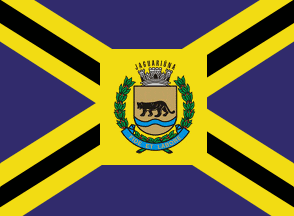 image by Dirk Schönberger,
23 November 2012
image by Dirk Schönberger,
23 November 2012Source: http://www.jaguariuna.sp.gov.br/bandeira.php

Last modified: 2012-12-10 by ian macdonald
Keywords: sao paulo | jaguariúna |
Links: FOTW homepage |
search |
disclaimer and copyright |
write us |
mirrors
 image by Dirk Schönberger,
23 November 2012
image by Dirk Schönberger,
23 November 2012
Source:
http://www.jaguariuna.sp.gov.br/bandeira.php
A black saltire, bordered yellow, on a blue field with the municipal arms on a yellow square in the centre.
Official website at
http://www.jaguariuna.sp.gov.br
Dirk Schönberger,
23 November 2012
Jaguariúna means in Tupi-Guarani "the black jaguar's river". The place was originally a stopping place on the old Goyazes Trail, used by the cowboys and the gold scavengers to go to Goiás and Mato Grosso. The settlements increased in the mid 19th century when sugar mills were established; after the sugar bust around 1860, Jaguariúna experiences a new boom with coffee cultivation. The urbanization of the area was initiated by Colonel Amâncio Bueno, the heir of a big domain located on the left bank of river Jaguary; he transformed parts of the domain into colonies manned with Italian immigrants. Incorporated in 1872, the "Cia Mogiana de Estradas de Ferro Navegação" built the Campinas-Mogi-Mirim railway line. On 3 May 1875, the locomotive "Jaguary", drawing five cars filled with notables, arrived at the Jaguary station, inaugurating the Campinas-Jaguary section of the line. On 27 August 1875, the remaining section of the line, Jaguary-Mogi-Mirim, was inaugurated by another special train carrying Emperor Peter II, the President of the São Paulo Province, and several notables. The next day, the train went back to Campinas, reaching the amazing speed of 41 km/h. In 1894, Colonel Amâncio Bueno inaugurated a chapel dedicated to the Blessed Virgin, built in Gothic-Byzantine style by the German architect Guilherme Giesbrecht. The settlement of Vila Bueno, also drafted by Giesbrecht, developed around the chapel. The same year, Vila Bueno was made a borough of Mogi-Mirim. The municipality of Jaguariúna was established on 30 December 1953.
The flag of Jaguariúna is prescribed by Municipal Law No. 320 of 3 July 1969. The flag is blue with a yellow-black-yellow saltire. In the middle is placed a yellow rectangle charged with the municipal coat of arms.
The coat of arms, placed in the middle of the flag, symbolizes the municipal government. The yellow rectangle represents the town as the seat of the municipality. The stripes of the saltire symbolize the municipal power spreading to the whole municipal territory. The quarters represent the rural estates located on the municipal territory. The meaning of the colours is the same as on the coat of arms.
Photos of the flag:
http://www.mcjeditora.com.br/portal/2012/06/prefeito-gustavo-reis-assina-documeto-junto-a-fifa-para-jaguariuna-se-tornar-um-centro-de-treinamento-de-selecoes
http://www.jaguariuna.sp.gov.br/ler_noticia.php?id=444
The coat of arms of Jaguariúna is prescribed by Municipal Law No. 134 of 18 August 1960. "Or a jaguar sable in base a fess wavy azure. The shield surmounted by a mural crown argent. The shield supported by two branches of coffee fructed proper. Below the shield a scroll azure inscribed with the motto 'FIDE ET LABORE' [Through Faith and Work] in letters or.
Or represents the wealth of the municipality, which culminated during the coffee boom. The jaguar recalls the name of the town, making the arms canting. The fess wavy represents river Jaguary.
http://www.jaguariuna.sp.gov.br/brasao.php - Municipal website
Ivan Sache, 24 November 2012